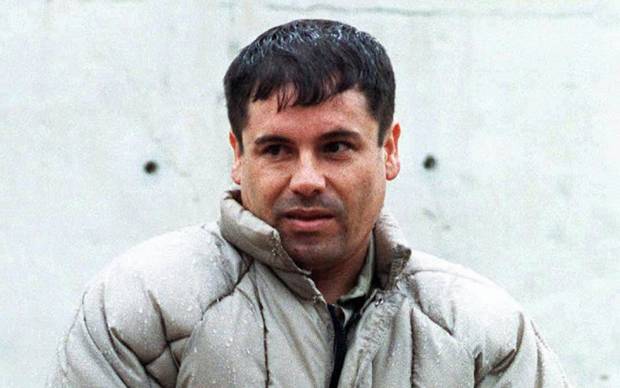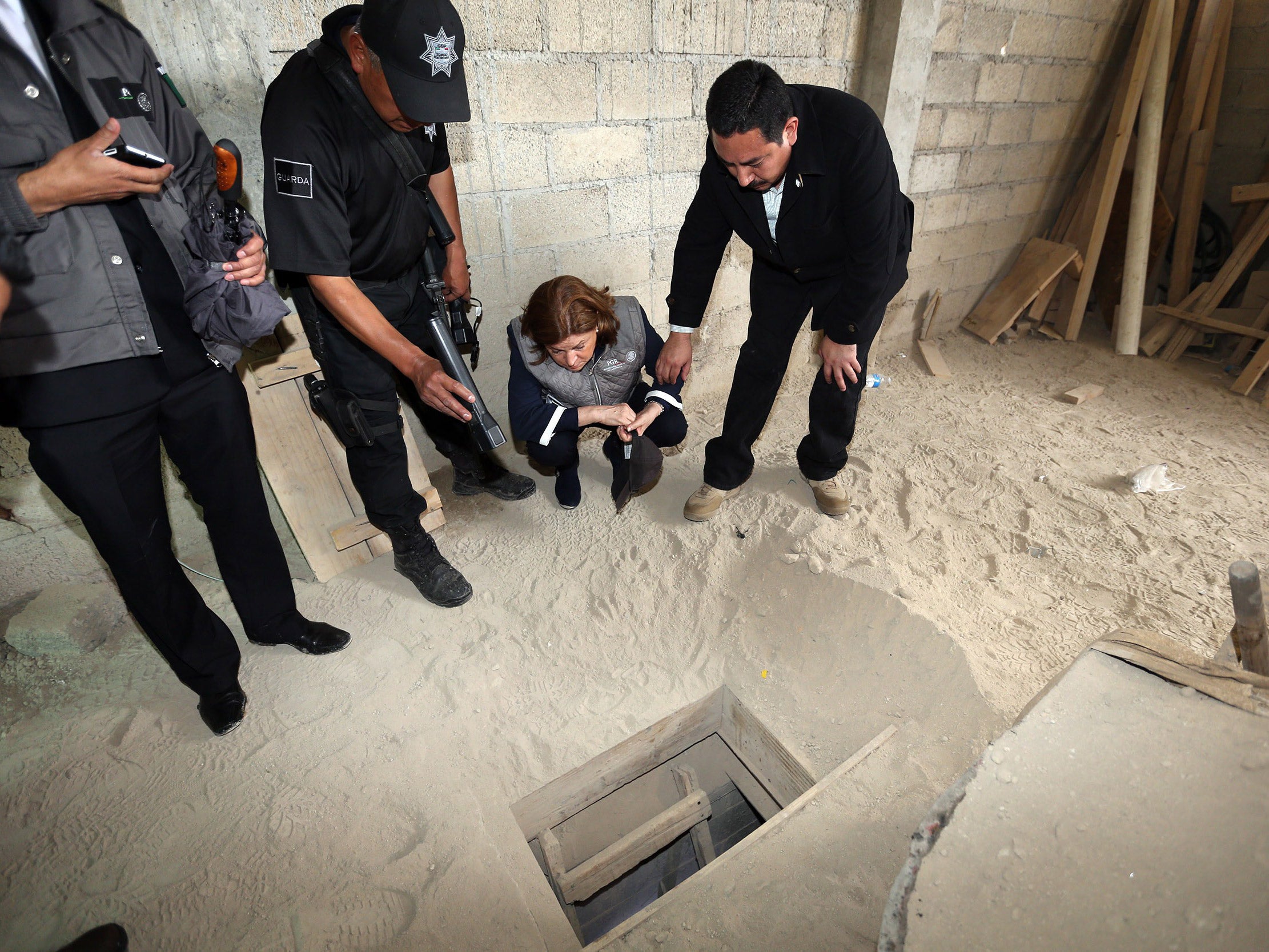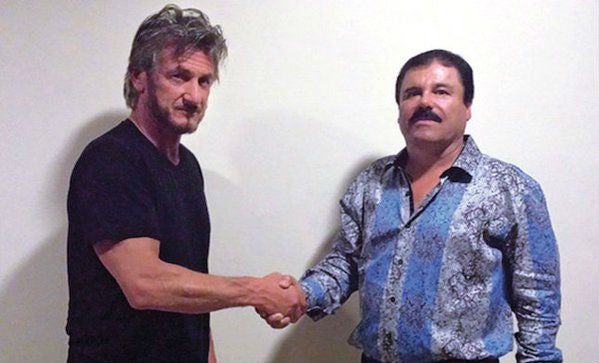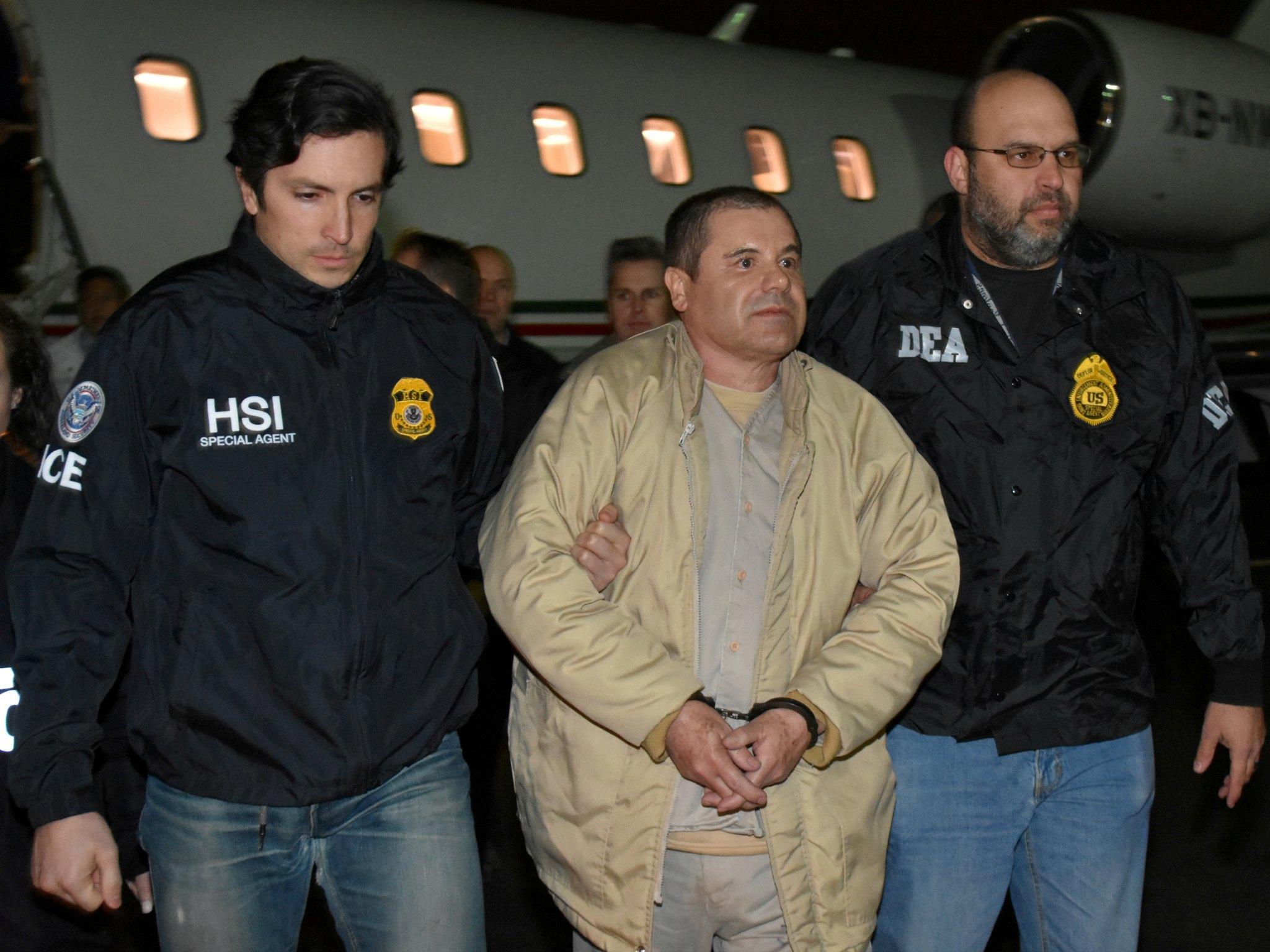El Chapo: Who is the Mexican drug baron and Sinaloa cartel kingpin and how was he brought to justice?
Farmer's son Joaquin Guzman rose from rural poverty to succeed Pablo Escobar as world's wealthiest narcotics trafficker, leaving behind a trail of bloodshed
Your support helps us to tell the story
From reproductive rights to climate change to Big Tech, The Independent is on the ground when the story is developing. Whether it's investigating the financials of Elon Musk's pro-Trump PAC or producing our latest documentary, 'The A Word', which shines a light on the American women fighting for reproductive rights, we know how important it is to parse out the facts from the messaging.
At such a critical moment in US history, we need reporters on the ground. Your donation allows us to keep sending journalists to speak to both sides of the story.
The Independent is trusted by Americans across the entire political spectrum. And unlike many other quality news outlets, we choose not to lock Americans out of our reporting and analysis with paywalls. We believe quality journalism should be available to everyone, paid for by those who can afford it.
Your support makes all the difference.Joaquin Archivaldo Guzman Loera, better known as El Chapo (“Shorty”), has been sentenced to life plus 30 years in prison by a US federal judge.
The Mexican drug baron founded the notorious Sinaloa cartel in 1989 and picked up where Colombia’s Pablo Escobar left off in dominating international narcotics trafficking, building up a vast fortune and leaving behind a bloody trail of vanquished enemies on both sides of the law.
He was arrested on 8 January 2016 – on the run following the second spectacular prison break of his career – and extradited to the US before he had a chance to make fools of the Mexican authorities for a third time.
“What Al Capone was to beer and whiskey during Prohibition, Guzman is to narcotics,” said Art Bilek, executive vice president of the Chicago Crime Commission. “Of the two, Guzman is by far the greater threat… And he has more power and financial capability than Capone ever dreamed of.”
El Chapo was born in La Tuna near Badiraguato, Sinaloa, in 1957, the son of a peasant cattle rancher and minor drug dealer growing poppies for opium to be sold in Culiacan and Guamuchil.
Routinely beaten by his father, a violent alcoholic, the young Joaquin played with homemade peso bills he had drawn himself and took to growing and selling marijuana to support the family.
By his late teens, he was working for local kingpin Hector Luis Palma Salazar, playing a logistics role in streamlining the movement of cocaine from his western home state northwards up the Pacific coast to the US.
Moving on to work for the feared Guadalajara cartel under Felix Gallardo in the early 1980s, El Chapo (the nickname a reference to his 5' 6'' stature) was fiercely ambitious about expanding the business into something much larger than merely serving as a middleman for the Colombians.
When Gallardo ordered the torture and murder of Enrique “Kiki” Camarena Salazar – an undercover Drug Enforcement Administration (DEA) agent who had infiltrated the syndicate and leaked information – in February 1985, the authorities pursued the cartel aggressively, their operations enabling El Chapo to capitalise on the chaos.
After Gallardo was arrested in 1989, the territories formerly dominated by Guadalajara were divided up among the remaining godfathers and the Tijuana, Juarez and Sinaloa cartels were formed, the latter under Guzman, Salazar and Ismael “El Mayo” Zambada Garcia, who would serve as El Chapo’s most trusted lieutenant.
As the net finally closed on Escobar, by now rich enough to be running his own rogue state within Colombia, the Mexican cartels gradually moved in to fill the void left by the latter's Medellin cartel and its Cali rival.
El Chapo and his men assumed control of the South America-US cocaine trade, employing ruthless and feared gangs like Los Chachos, Los Texas, Los Lobos and Los Negros to enforce for them, carrying out acts of intimidation, bribery, torture or execution as a matter of course.
The Sinaloa cartel met demand north of the Texas border by finding ever more innovative ways to move their product, from building air-conditioned tunnels burrowing under fences to concealing cocaine inside fire extinguishers or cans of “chili peppers” shipped overseas.
Over time, the syndicate would grow ever more powerful, taking out rival gangs and law enforcement to spread their influence, eventually branching out over five continents and moving into heroin, marijuana and methamphetamines.
Very little changed when El Chapo was arrested in Guatemala in 1993, extradited to Mexico and sentenced to 20 years in prison. He simply bribed his guards to ensure favourable conditions and was allowed to dispatch orders to his brother Arturo as usual.
He even held lavish Christmas parties with his entire family in his cell and enjoyed conjugal visits with his mistress, Zulema Hernandez, a former cop serving time herself for armed robbery who would later be murdered by rival Los Zetas sicarios.

On 19 January 2001, El Chapo escaped from the maximum-security Puente Grande prison in Jalisco. According to myth, he did so hidden in a laundry basket. The truth, as Anabel Hernandez tells it in her book Narcoland (2010), is that he did so in a police uniform, with a police escort, after guard Francisco Camberos Rivera opened the door for him.
Seventy-eight members of prison staff, including governor Valentin Cardenas, were subsequently arrested for their part in the escape following an investigation.
El Chapo evaded capture for 13 years despite a manhunt instigated by US and Mexican authorities bringing together the FBI, CIA, DEA and the Mexican army. Their failure to find him - even with a $5m reward offered for information leading to his capture - spoke volumes about the endemic corruption taken root as a result of Guzman and his pernicious influence.
Meanwhile, the drug war intensified, making cities like Tijuana and Juarez among the most violent places on Earth, where scenes of men hanged from freeway overpasses and horror stories about dead gangsters being dismembered in the desert became entirely commonplace.
El Chapo's family – including at least 13 children from three marriages - saw their American assets seized in 2012 but business again continued as usual and he even managed to cultivate a reputation in Sinaloa as a Robin Hood figure, paying for food and medical supplies for local people, who came to see him as a savour when the state was failing them.
That same year, Forbes magazine valued his net worth at around $1bn.
When he was finally arrested again, in the Pacific beach resort of Mazatlan in February 2014, President Enrique Pena Nieto refused to transfer him to US custody, saying: “It would be unforgivable for the government not to take the precautions to ensure that what happened last time would not be repeated.”
And yet that’s exactly what happened.

On 11 July 2015, El Chapo escaped again, this time through a tunnel running 30ft beneath the Toluca prison showers to a house under construction a mile away.
In hiding again, it was at this juncture that one of the most surreal episodes in his story took place: an interview conducted in secret by Hollywood actor Sean Penn for Rolling Stone.

“El Chapo Speaks” was published on 10 January 2016 and sees Penn recount in detail his encounter with Guzman, organised on his behalf by Mexican TV actress Kate del Castillo, who had exchanged friendly letters with the master criminal after praising his peculiar brand of philanthropy on social media.
While the interview was curtailed by a military raid on Guzman’s jungle compound in which the latter suffered a leg injury, he did later send the actors a video message in which he answered their questions about his career.
“It’s a reality that drugs destroy,” he told Penn. “Unfortunately, as I said, where I grew up there was no other way and there still isn’t a way to survive, no way to work in our economy to be able to make a living.”
The gangster reportedly hoped to turn the meeting into an opportunity to discuss a potential biopic recounting his exploits: while that never came to pass, he is now the subject of a major Netflix series.

Finally re-arrested on 8 January 2016 after a shoot-out in the city of Los Mochis, President Pena Nieto proclaimed: “Mission Accomplished. We have him.”
After judge Vicente Antonio Bermudez Zacarias, set to preside over his case, was murdered while out jogging near his home on 17 October 2016, El Chapo was extradited to the US last January where he plead “not guilty” to a 17-count indictment.
El Chapo's trial, guilty verdict and sentencing in New York this spring has made for a sensational event but, sadly, its outcome is unlikely to have much of an effect on the brutal drugs trade, even if it is disingenuously cheered as a step in the right direction by the Mexican government.
In 2017, a year in which Guzman was for once safely behind bars, a record 29,168 murders took place, according to local estimates, the total surpassing the previous high of 27,213 in 2011.
The brutal truth is that a successor will simply step in to take El Chapo's place at the head of the Sinaloa cartel and the killing will continue.

Join our commenting forum
Join thought-provoking conversations, follow other Independent readers and see their replies
Comments